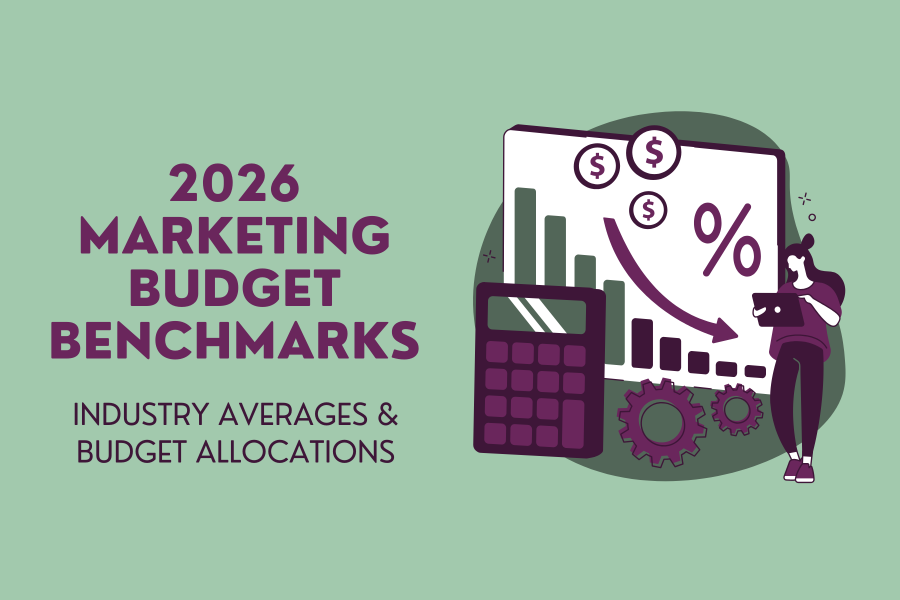B2B Marketing Budget Benchmarks for 2026 Planning
As we get closer to 2026, marketing is changing and changing fast. The rise of AI and Generative Engine Optimization is causing marketers to adjust their strategies and rethink their budgets.
Does your marketing need to change to keep up in 2026?
Let’s find out.
We’re using these B2B marketing budget benchmarks to compare marketing plans to industry norms, help you determine how much you need to spend, and which line items should get your budget to win more market share.
With a little bit of data and your company’s strategic plan, a thoughtful marketing budget is sure to help you reach your goals, stay ahead of your competition, and keep up with the changing marketing landscape.
B2B Marketing Budget Benchmarks by Industry
If you are unsure of how much budget to allocate to marketing, start by looking at marketing budget benchmarks in your industry. Industry averages will help you see if you are on the right track to keep up with organizations similar to yours.
Look at the average percentage of revenue others in your industry spend on marketing.
Since no number can tell you exactly what others in your industry are spending, consider multiple resources. Here are a few trustworthy sources we found sharing information about recent marketing budget benchmarks.
A Gartner survey showed that across all industries (both B2B and B2C), the average organization spends about 7.7% of its revenue on marketing. They also shared industry breakdowns.
Media: 8.0%
Insurance: 7.5%
Tech (With over $250M revenue): 7.1%
Financial Services: 7.2%
Healthcare: 5.9%
IT & Business Services: 5.8%
A report shared by HubSpot puts marketing budgets a bit higher than Gartner’s findings.
Media: 13.82%
Financial Services & Insurance: 11.18%
Professional Services: 11.06%
Healthcare: 9.31%
Tech: 9.16%
A survey of CMOs conducted by Deloitte found that on average, companies spend 9.1% of their revenue on marketing.
These numbers show that companies spend about 8.64% of their revenue on marketing on average.
What Impacts Marketing Budget Benchmarks?
Marketing budget benchmarks are great for helping you determine where to start your marketing budget. They can offer insight into what is needed in your industry to keep up with your competitors, but these numbers can also be misleading.
Always add context to what can cause these numbers to increase or decrease.
Marketing budget benchmarks can be impacted by:
Company Size: Larger organizations will likely spend more on their marketing than companies in the same industry with smaller teams and less revenue.
Marketing Stage: An organization that is in a foundational stage of marketing (launching their brand or introducing new products/services) will need a larger budget than a company in maintenance mode (that has an established group of customers). Additionally, a company with growth plans (that wants to increase market share and drive new revenue) will need a larger budget.
Goals: Goals, like the marketing stage, will have a large impact on the need to spend marketing dollars. A company with growth goals will need to set aside more resources for marketing.
Resources: Available resources can have a direct impact on marketing budgets. A bootstrapped organization may not have the same available resources as an organization that has received funding or investments.
Benchmarks are a great place to start, but they don’t always offer the full story. Before you compare your brand to others in your industry, make sure you are looking at the big picture, not just the percentage points.
Related: Do You Have the Right Marketing Budget? Here’s How to Find Out
Marketing Budget Allocation Benchmarks
Setting a marketing budget is one thing. Determining how to spend it is another.
Once you have an idea of how much of your revenue you want to allocate to marketing, consider how you will divide those dollars.
You can also use benchmarks to determine how to split up your marketing budget. While surveys and organizations don’t always use the same categories when splitting their marketing budgets, the numbers can still be helpful and insightful.
The Gartner study shared how marketers, on average, across both B2B and B2C spend their budgets across board categories. The survey also dug deeper into how companies more specifically spend their digital marketing dollars. These marketing budget benchmarks offer insight into the categories that organizations believe offer the best return on their spending.
39% labor
39% outsourced agency services
18% media
13.9% search advertising
12.5% digital display advertising
12.2% social advertising
12% technology
10.7% video and streaming
8.9% SEO
7.5% audio and podcast
7.4% email marketing
5.9% influencer marketing
5.5% sponsored content
3.5% SMS/push notifications
12% other
In the HubSpot survey, marketers shared how they allocate their B2B marketing budget across all categories. Advertising and media were the biggest spend in aggregate among both HubSpot and Gartner surveys.
18% paid advertising
17% technology
16% account-based marketing
14% content
14% people
14% research
6% other
The Deloitte survey shared another way to look at breaking down marketing budgets.
17% digital marketing
14% events, tradeshows, conferences
13% tech (CRM, email, app)
13% traditional
13% affiliate & partner marketing
13% PR & communications
13% sponsorships
5% other
Marketing needs are not one-size-fits-all. Look at both broad marketing benchmarks and then drill down to get more specific industry details as you inform your marketing budget.
(Are you looking for another way to figure out your marketing budget? Check out our marketing budget formula for a more detailed look at breaking down marketing spend.)
Get a More Precise 2026 Marketing Budget
Marketing budget benchmarks are a great place to start when determining how much money to spend on marketing, but benchmarks are just one piece of the puzzle.
As you set your 2026 marketing budget, consider all the factors: business stage, goals and planned business launches, resources, company size, and direct competitors. Also, look at how you plan to spend marketing dollars and whether or not you need to increase or decrease those funds to remain competitive or based on current allocations.
Looking at the whole picture of your marketing strategy is how you will land on the most accurate 2026 marketing budget.
If you need help, SpotOn Digital is here. Talk to us about how our research and strategy team can look at the full picture of your brand, goals, and competition to land on the best budget. Contact us to get started today.

